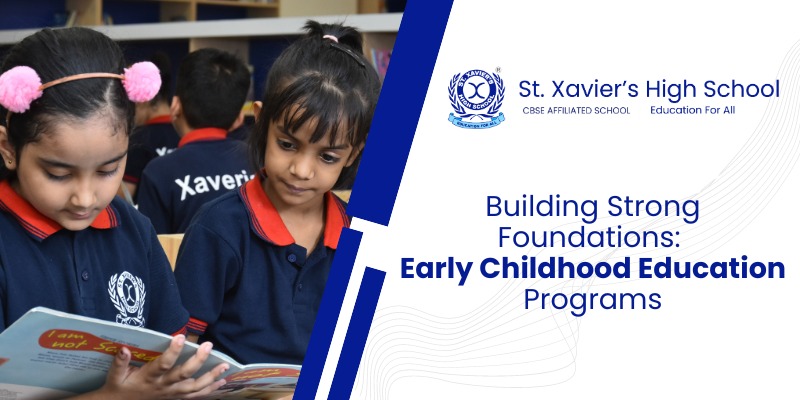Introduction
At St. Xavier’s School in Noida, recognized as One of the top 10 schools in greater noida west, the early childhood education program is designed to provide young learners with a strong foundation in their critical formative years. Understanding that the early years of a child’s life are pivotal for cognitive, emotional, and social development, the School has meticulously crafted programs that nurture these aspects, setting a solid groundwork for lifelong learning and success.
-
The Importance of Early Childhood Education
Research consistently underscores the significance of quality early childhood education. It plays a crucial role in shaping a child’s future, impacting everything from academic achievement to social behaviors and even career success. The School leverages this pivotal phase through its comprehensive and thoughtful educational practices.
-
Curriculum Design in Early Childhood Education
-
Holistic Development Focus
The curriculum is not solely academic-focused but is designed to promote holistic development. It includes a balanced mix of cognitive, motor, emotional, and social activities which are age-appropriate and engaging.
-
Integration of Play-Based Learning
Recognizing the importance of play in early learning, the School incorporates structured play into the daily routine. This approach helps children learn through activities they naturally enjoy, enhancing their engagement and retention of new concepts.
-
Language and Literacy Development
From storytelling sessions to interactive alphabet games, the focus on language and literacy is intense and immersive. These activities are aimed at enhancing vocabulary and communication skills from a young age, providing a critical foundation for academic and personal success.
-
Facilities and Resources
-
State-of-the-Art Learning Environments
The early childhood classrooms at the School that are specifically designed to cater to young children, with furniture and decor that are age-appropriate and conducive to learning. Classrooms are equipped with learning materials that are safe, engaging, and educational.
-
Outdoor Play Areas
The School understands the importance of physical activity for young children. The school boasts well-equipped outdoor play areas that allow children to explore, play, and learn in a controlled and safe environment.
-
Teacher Expertise and Continuous Professional Development
- Qualified and Passionate Educators
Teachers at the School are not only qualified but are passionate about early childhood education. They are trained to create nurturing learning environments that encourage children to explore and grow.
-
Ongoing Training Programs
The School invests in continuous professional development for its educators, ensuring they stay abreast of the latest pedagogical strategies and technologies in early childhood education. This commitment to excellence in teaching is a cornerstone of the program’s success.
-
Parental Involvement and Community Engagement
-
Open Communication Channels
The School maintains open lines of communication with parents, providing regular updates on their child’s progress and involving them in educational activities. This partnership helps reinforce the learning environment at home and supports children’s overall development.
-
Community Participation
The school organizes events where the community can engage with the early childhood program, such as open days, plays, and art shows. These events allow children to showcase their learning and achievements and reinforce the community’s role in supporting early education.
-
Impact on Student Outcomes
- Strong Academic Foundations
Children who graduate from the early childhood program at the School which typically displays strong literacy and numeracy skills, which are essential for their future academic journey.
-
Social and Emotional Development
The program also emphasizes social and emotional skills, such as sharing, cooperation, and empathy. These skills are critical for personal development and are cultivated through group activities and guided social interactions.
-
Future Directions and Innovations
-
Embracing Educational Technology
Looking forward, the School is exploring ways to integrate appropriate technology into early childhood education. This includes the use of interactive apps and digital storytelling tools that can enhance learning experiences without replacing the human touch.
-
Expanding Inclusive Education Practices
The School is committed to inclusivity and plans to further enhance its curriculum to accommodate children with diverse learning needs. This involves training staff in inclusive education practices and tailoring learning materials and activities to meet a wide range of learning styles and abilities.
-
Enrichment Programs and Extracurricular Activities
-
Diverse Extracurricular Opportunities
The School recognizes the value of extracurricular activities in early childhood development. These programs are designed to complement the academic curriculum and provide a well-rounded education. Activities range from music and dance to sports and arts, catering to various interests and talents and allowing children to explore their passions beyond the classroom.
-
Cultural Immersion and Language Programs
Understanding the benefits of early exposure to multiple languages, the School offers programs in different languages, including French, Spanish, and Mandarin. This not only enhances cognitive skills but also prepares students for a globalized world. Cultural immersion activities, such as celebrating international festivals and participating in traditional arts, further broaden children’s horizons and promote cultural appreciation.
-
Innovative Teaching Methods
-
Inquiry-Based Learning Approach
At School, the emphasis is on inquiry-based learning where curiosity is the driving force behind the education process. This method encourages young students to ask questions and explore answers through guided discovery, fostering a love for learning and developing critical thinking skills.
-
Montessori and Reggio Emilia Influences
The early childhood curriculum incorporates elements from renowned educational approaches like Montessori and Reggio Emilia. These methods emphasize self-directed activity, hands-on learning, and collaborative play, which help children develop confidence and independence at a young age.
Conclusion
St. Xavier’s School in Noida sets the standard for early childhood education among the top school in noida extension. Through its comprehensive and thoughtful approach, the school not only fosters academic abilities but also nurtures the emotional and social skills necessary for children to thrive. As these young learners grow, the foundations laid at the School ensure they are well-prepared to face the challenges of formal schooling and beyond, affirming the school’s commitment to building strong, capable, and well-rounded individuals.

